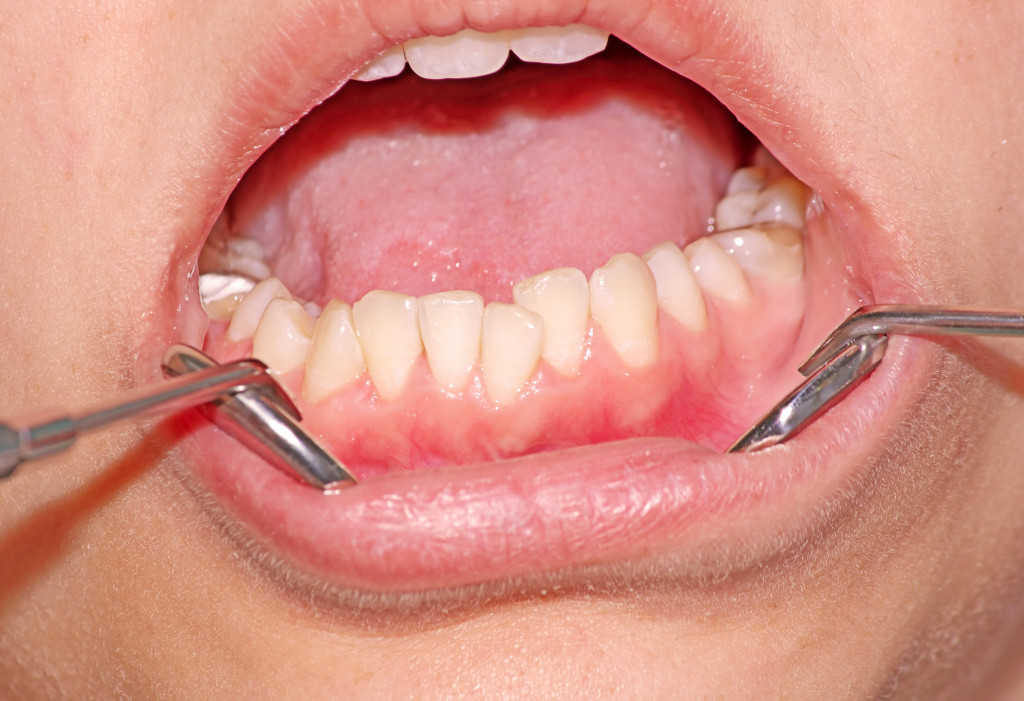- Get dental treatments to restore missing teeth, support neighboring teeth, and reduce jawbone loss.
- Improve oral hygiene by brushing with fluoride toothpaste and flossing daily to ensure cleanliness and health.
- Rinse with an antibacterial mouthwash to reduce bacteria and plaque buildup, fight bad breath, and promote a cleaner mouth.
- Avoid smoking, limit alcohol consumption, and cut down on sweets and sugary drinks to reduce the risks of gum diseases.
Gum health is an integral part of overall oral hygiene. Healthy gums are essential for a strong, healthy smile and can help reduce the risk of serious dental problems such as gum disease and tooth loss. Fortunately, there are several simple things that you can do to maintain your gum health and keep them looking its best. By following these tips, you can ensure that your gums stay healthy and strong for years.
Consider getting tooth implants.
Tooth implants may be necessary for those looking to maintain good gum health. By replacing a missing tooth and restoring its function, the implant helps to support neighboring teeth and prevent levels of jawbone loss that can occur when a missing tooth goes untreated.
Furthermore, restoring the lead’s regular oral functions, such as dental hygiene or eating habits, allows them to care for and protect the rest of their teeth from further infections or damage. Patients need to evaluate their individual needs and consult with their dentist to ensure that getting an implant is the best course of action for improving gum health and preventing further complications.
Improve your oral hygiene.
Here are some tips on how to improve your oral hygiene:
Brush your teeth twice a day with fluoride toothpaste.
Brushing twice daily with fluoride toothpaste is essential to maintaining good oral hygiene and health. Not only does it help remove plaque and bacteria, but the right toothbrush and quality fluoride toothpaste can also help strengthen teeth by remineralizing tooth enamel.
It’s essential to regularly brush your teeth to keep gums healthy, as plaque buildup can lead to inflammation of the gums, also known as gum disease. Proper care of your oral health will ensure better overall health, fresher breath, and a brighter smile.
Floss daily

Flossing daily is essential for maintaining gum health, as it helps remove food particles and plaque from between the teeth, preventing potential problems from arising. Regular flossing ensures the gums stay healthy and infection-free due to bacteria build-up.
Flossing should be done gently and carefully to avoid damaging the gums or hurting oneself. It is necessary to floss at least once every day, and upon doing so, one should use a clean section of floss for each tooth until all have been cleaned.
Additionally, one can visit their dentist regularly to help ensure that the desired level of gum health has been achieved. This practice is critical because a lack of proper dental hygiene can lead to gingivitis, an inflammation of the gums caused by bacteria build-up; if left untreated, this condition may develop into periodontal disease.
Rinse with an antibacterial mouthwash.

Proper rinsing with an antibacterial mouthwash is essential for maintaining healthy gums. Not only does it help to reduce bacteria and plaque in the mouth, but it also helps to fight bad breath and promote a cleaner, healthier mouth. Rinsing with an antibacterial mouthwash should be done twice or thrice daily–after eating breakfast, lunch, and dinner or after brushing your teeth twice daily.
Swishing a teaspoonful of liquid around your teeth for up to 30 seconds is recommended, and then spitting it out. Making sure to use one without alcohol can help reduce any potential irritation of tender gums. A mouth rinse has antiseptic properties that can kill germs and prevent periodontal disease development.
Quit smoking and limit alcohol consumption.
Quitting smoking and moderating alcohol are two of the best ways to keep healthy gums. Smoking can contribute to gum disease due to creating toxins that irritate and destroy gum tissue. Additionally, smoking restricts blood flow, reducing nutrients needed for healthy gum tissue. Alcohol consumption in excess also increases dehydration and decreases salivary flow, which is necessary for retaining healthy oral bacteria balance in the mouth.
In addition, it makes it more difficult for existing dental treatments to succeed, as healing times will stretch out and may need to be more effective. Maintaining good gum health is essential for preventing other systemic diseases such as diabetes and cardiovascular disease since the mouth is the starting point of the body’s immunity system.
Avoid sticky sweets and sugary drinks
Proper oral hygiene is a key factor for optimal gum health. To maintain overall gum health, avoiding sticky sweets and sugary drinks is important. Sweets that are sticky or hard can get stuck in between teeth and encourage the growth of bacteria, leading to gum disease. Sugary drinks are also detrimental to oral health, as consuming excessive amounts of sugary beverages will increase the risk of cavities and decay in both your teeth and gums.
Cutting down on sweet treats and limiting sugary drink consumption will lead you to better gum health. Not only have research studies demonstrated improvement in oral health when reducing sugar intake, but also cutting out sweets can improve overall well-being by reducing risks such as toothache, cavities and even gum disease caused by overconsumption of sugars.
These are just some tips to help maintain good gum health and a strong, beautiful smile. Making sure you follow these simple steps will guarantee that you have healthy gums now and in the future!
